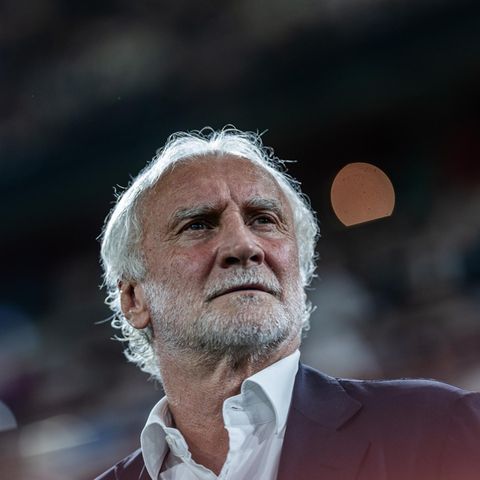Own Palestinian state
What is at stake for the UN for Palestine and Israel
Copy the current link
Add to the memorial list
Israel wants to prevent them, numerous states worldwide support them: the recognition of an independent Palestinian state. What consequences this can have for both sides.
The Gaza War further fueled the question of whether there will be an independent Palestinian state in the future. Most recently, states such as France, Great Britain or Portugal have announced to recognize Palestine. The aim is to exert pressure on Israel, end the cruel war in the Gaza Strip and keep the two -state solution alive with a view of a peace solution.
For that, France want And advertise Saudi Arabia at a summit on Monday. It is expected that other countries at the meeting in New York formally recognize a Palestinian state. This step is likely to have sharp reactions from Israel and the USA. Both countries boycott the meeting. Germany takes part in the conference, but the federal government does not want to support a Palestinian state for the time being. The general debate of the general assembly also begins on Tuesday at the United Nations. Germany is represented in New York by Federal Foreign Minister Johann WadePhul.
How did we get this point?
After the First World War, Palestine was under British administration. London promised both Jews a “national home” and Arab support, which led to growing tensions. After the Holocaust and the murder of around six million Jews by Nazi Germany, the UN decided in 1947: a state of Israel for Jews, a state of Palestine for Arabs. While the Arabs rejected, the Jews called Israel in 1948. The following war against several neighboring countries ended with Israel’s victory and the escape of more than 700,000 Palestinians (“Nakba”). Another hundreds of thousands fled in 1967 in the six -day war (“Naksa”).
The Palestinian Freedom organization (PLO) called an independent in 1988 Palestinian State out of. Most recognized this States of the global south quickly. In the 1990s, the peace process initially brought hope, but central questions such as limits, the status of Jerusalem, refugees and settlements remained unsolved. Acht of extremists and the division of the largest Palestinian organizations Hamas and Fatah also weakened the chances of their own Palestinian state.
What should happen at the conference in New York?
According to the will of the organizers, the high-ranking meeting for the two-state solution should today form the tone for the general debate of the UN General Assembly that starts the following day. The message: The global community demands an end to the Gaza war and a return to the negotiating table-immediately. Great Britain, Canada and Australia, which Palestine recognized as the first major western economic nations, were the beginning of the weekend.
The British Prime Minister Keir Starmer and his Canadian counterpart Mark Carney will also speak at the conference. France’s President Emmanuel Macron is likely to follow suit today and also take the first step of the recognition of Palestine – Belgium, New Zealand and other smaller states have also announced or indicated recognition.
What should that bring?
Although around 150 of the 193 UN Member States have already recognized Palestine, the decision of several central world powers, which traditionally belong to Israel’s closest partners, weighs particularly difficult. It is even more decisive that this recognition should support the endangered two -state solution – it is at risk from Israel’s settlement expansion in West Bank, Annexion plans and the weakening of the Palestinian Authority in Ramallah.
For the Palestinians, the step means additional legitimacy in the pursuit of their own state; He could pave the way for full un-membership. The two -state solution provides for the equal side of an Israeli and a Palestinian state. The Palestinian ambassador to Great Britain, Hussam Somlot, says that recognition could lead to strategic partnerships: “We will be at eye level.”
Skeptics refer to China, India, Russia and many Arab states. They recognized Palestine decades ago, but have little influence on the Middle East conflict. Because without a full UN seat or control over its own limits, the PA can only lead bilateral relationships to a limited extent.
How big is the risk of recognition?
Prime Minister Benjamin Netanyahu is undeterred in the Gaza War and could use the situation to further escalate the conflict. Observers even consider it possible that he could counter the state recognition of Palestine to proclaim the annexation of Palestinian areas in order to in fact burial a two -state solution. Netanyahu will address the general assembly on Friday.
With their decision, France, Great Britain and Canada also risk dissatisfaction with Israel’s close partner USA. President Donald Trump – notorious for his unpredictable behavior – could consider development as an affront.
Why does Israel reject Palestine’s recognition?
The Israeli government sees the two -state solution as an existential danger and accuses the Palestinian Authority of promoting terror; Palestine’s recognition is also the “reward for Hamas”, which strives for Israel’s destruction and is responsible for the unprecedented massacre of October 7, 2023. Most recently, however, 142 countries under French and Saudi leadership had spoken out for disempowering Hamas.
Meanwhile, the Netanyahus, the legal-religious government, continues to expand the settlements in 1967 West Bank and in East Jerusalem, where over 700,000 settlers now live alongside around three million Palestinians-from the perspective of many, there is only one “patchwork” for a possible state.
How does Germany behave?
For the German Federal Government around Chancellor Friedrich Merz (CDU), it is a wire rope act to navigate the crisis in Middle East between solidarity with Israel and the pressure of the European allies and the mood of the German population. Most recently, the federal government had criticized the Israeli procedure in the Middle East conflict and restricted the export of weapons to Israel.
However, Germany currently rejects recognition of the state of Palestine, despite everything. This is only possible at the end of a peace process, Berlin emphasizes again and again. Germany’s Foreign Minister Johann WadePhul will therefore take part in the conference as a supporter of a two -state solution, but will not announce a new position of the government there. In the end it was not even clear whether Germany could even talk in the three -hour event – the Foreign Minister may not even disturb the Foreign Minister in view of the difficult topic. Israel and the USA boycott the event. Palestinian President Mahmud Abbas will not be physically present either-because the Trump government refused a visa, he must speak via video stream.
Dpa · Reuters
TIS / by Benno Schwinghammer and Sara Lemel
Source: Stern
I have been working in the news industry for over 6 years, first as a reporter and now as an editor. I have covered politics extensively, and my work has appeared in major newspapers and online news outlets around the world. In addition to my writing, I also contribute regularly to 24 Hours World.




